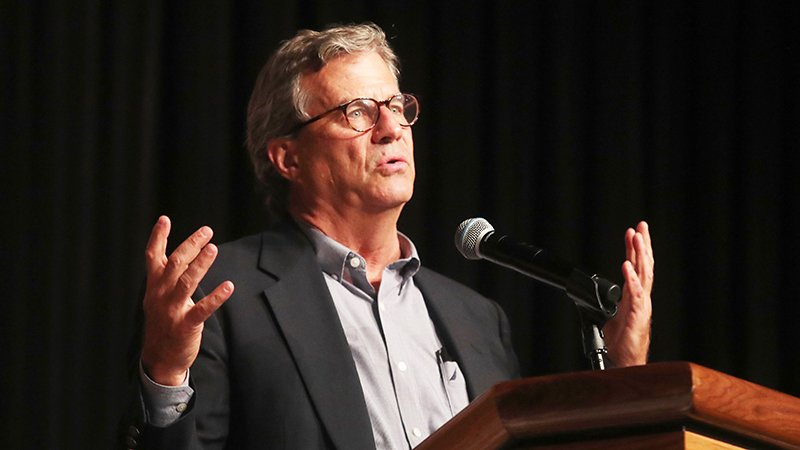The opiate epidemic is "the deadliest drug scourge in the history of our country," a noted author and journalist told members of the Arkansas Association of Counties at their annual conference in Hot Springs this week.
Sam Quinones, a Los Angeles based freelance journalist and author of "Dreamland: The True Tale of America's Opiate Epidemic," was the keynote speaker during Thursday's luncheon of the association's 51st annual conference at the Hot Springs Convention Center.
He has testified before the U.S. Senate's Health Committee; at professional conferences of judges, doctors, librarians, and hospital administrators; and at more than two dozen town hall meetings in small towns across the country. His talk Thursday comes on the heels of the recent lawsuit filed by Arkansas Attorney General Leslie Rutledge against three opioid manufacturers, Purdue Pharma, Johnson & Johnson and Endo Pharmaceuticals.
"We are in the midst of what is clearly the deadliest drug scourge in the history of our country," he said, noting, "Even if the numbers begin to drop, they're still so horrifyingly high, that it seems to me like it's going to take a while to get our arms around this."
He delved into the research conducted for his book, starting with an examination of the cultural, economic and medical climate of the 1980s. Before then, heroin was imported over great distances from places such as Turkey and Burma, he said, and was expensive, as well as "far less potent."
The 1990s ushered in the rise of Colombian, then Mexican drug cartels, transporting cheaper and more powerful heroin, he said. "Very separately, we saw a revolution in pain management in modern America."
He said doctors realized they had a tool that could effectively eradicate pain: opioids.
Well-intentioned young doctors pushed the use of opioids, and were soon joined by their "natural allies," pharmaceutical companies, Quinones said.
"Together, these guys pushed, and pushed and pushed and began to slowly change attitudes. This was in the halls of hospitals, not in the public. They were marketing to doctors" with "almost a missionary zeal," he said.
These actions resulted in the idea that Americans are "in an epidemic of pain" and "incapable of tolerating any pain at all." Opioids were the answer to this, Quinones said.
"We wanted quick. We wanted easy. We wanted to go in and have our problems resolved quickly, immediately," and as a result "began to use doctors as car mechanics."
Despite what is known now, opioids were, at the time, thought to be "virtually nonaddictive," he said.
Quinones cited 1996 as a "crucial year" in which the number of opioid prescriptions skyrocketed, largely due to the introduction of OxyContin.
"Before OxyContin, people messed around with low doses of Vicodin or Percocet. They abused those pills, but they never developed this raging, raging, desperate daily need, because all those pills contain acetaminophen. So, by the time you get up to a really serious dose, you've done a lot of damage to your liver, your kidneys, your internal organs. There was no bridge to take them to something far more desperate, like heroin, until OxyContin came out," Quinones said.
"In my opinion, we would not have the heroin problem we have today without OxyContin. OxyContin laid the groundwork. It created this brand new population of opioid addicts across the country."
Upon the realization of such addiction, doctors would cut patients off. This resulted in people turning to the black market to feed their addictions. Without insurance, OxyContin rates were high and in the face of this a "natural substitute" was found: heroin, he said. Since heroin is cheaper and produces the same, but a longer-lasting "high," the 2000s saw an increase in people switching to it from pills.
Despite this "nicely packaged" historical narrative, as he described it, Quinones said other factors also lead to the current opioid crisis.
"It's not just about pharmaceutical marketing. It's not just about drug traffickers out of Mexico. It was about who we had become as Americans, what we had become, I think, as a country," he said.
"At the root of this, we had spent 35 years in this country destroying community in America. We exalted the private sector. Came to believe the free market was some infallible god."
As a result, the opioid epidemic is "a nightmare created almost entirely by the private sector," he said.
Quinones said he sees heroin as the "final expression of values that we've fostered for 35 years in America. The final expression of our fetish for the private at the expense of the public."
"Heroin's the final stuff for a culture that believes if you buy enough stuff you'll one day be happy. Heroin turns every addict into a narcissistic, self-absorbed solitary hyper-consumer," he said.
However, Quinones did have a proposed remedy for the opioid crisis.
"I believe more strongly than ever that the antidote to heroin is not marketing, it is community," he said. "The way to attack the problem is to rebuild community."
He said the crisis is an unprecedented opportunity for change and bipartisan unity.
"It's the only domestic issue that I can think of that unites red and blue. It's showing us that there's an opportunity to unite around the idea of American recovery."
He said the role of county employees and officials is "crucial" to combating the epidemic, largely due to the fact that "counties are the level of government where this epidemic has had the most severe impact."
Quinones said counties are also where some of the most "beautiful innovations" are taking place.
"We are seeing Americans come together, beginning to rebuild the bulwarks of defense that come with community," he said. "One day, your town will thank you. The people of your county will thank you. I believe your country will thank you."
Local on 08/24/2019